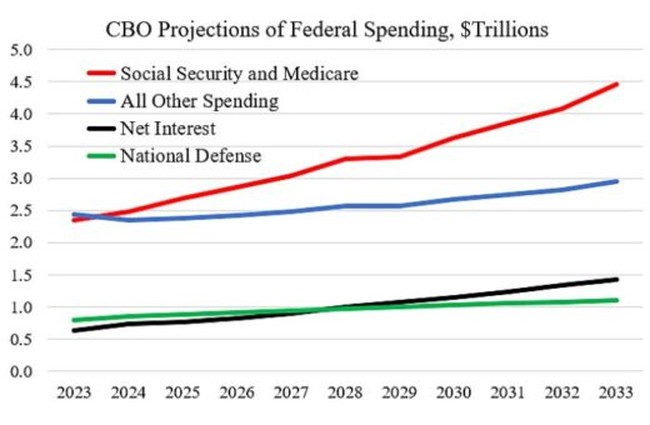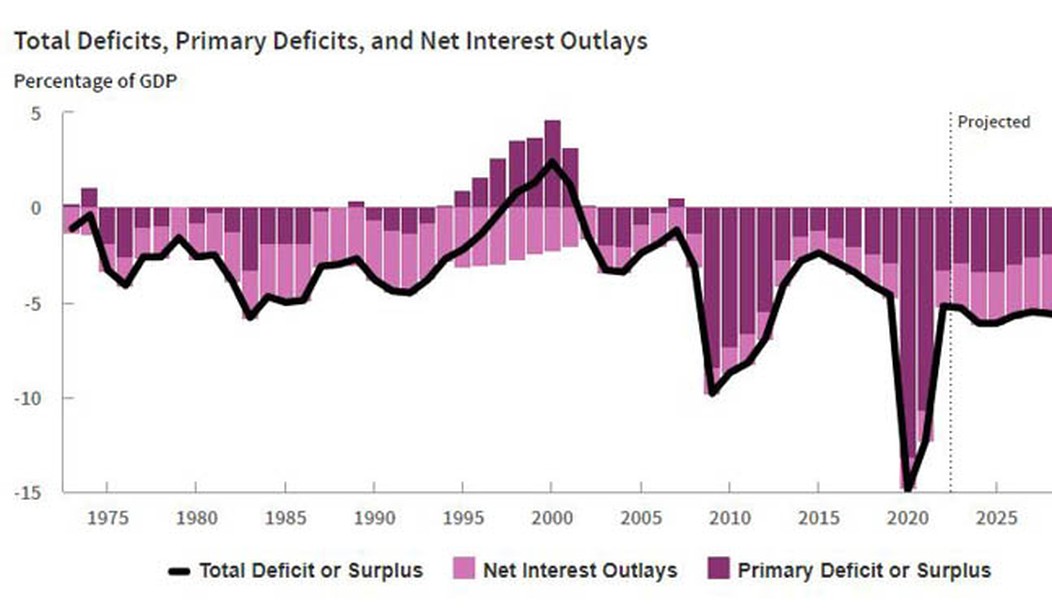Just last month the NY Times published a story about the growing US debt. The story relied on what were, at the time, the most recent estimates from the Congressional Budget Office.
America’s debt is now six times what it was at the start of the 21st century. It is the largest it has been, compared with the size of the U.S. economy, since World War II, and it’s projected to grow an average of about $1.3 trillion a year for the next decade.
Today, the CBO put out a new estimate which is significantly worse. Now the US is projected to average $2 trillion per year, adding another $19 trillion to the debt over the next decade.
The United States is on track to add nearly $19 trillion to its national debt over the next decade, $3 trillion more than previously forecast, as a result of rising costs for interest payments, veterans’ health care, retiree benefits and the military, the Congressional Budget Office said on Wednesday.
The new forecasts, released Wednesday afternoon, project a $1.4 trillion gap this year between what the government spends and what it takes in from tax revenues. Over the next decade, deficits will average $2 trillion annually, as tax receipts fail to keep pace with the rising costs of Social Security and Medicare benefits for retiring baby boomers.
To put those numbers in context, the total amount of debt held by the public will equal the total annual output of the U.S. economy in 2024, rising to 118 percent of the economy by 2033.
President Biden was bragging about cutting the deficit just last week during his State of the Union address. As I pointed out here, what he said was intentionally dishonest and that was before these new CBO numbers. Now it’s clear that deficits will be going up toward the end of his term unless something changes.
The new CBO numbers also point to increased spending on entitlement programs as one of the main drivers of future deficits.
New forecasts from the nonpartisan Congressional Budget Office, released on Wednesday, showed Medicare and Social Security spending growth rapidly outpacing the growth in federal tax revenues over the next 10 years. That is the product of a wave of baby boomers reaching retirement age and beginning to tap the programs, which provide guaranteed income and health insurance from the time benefits are claimed until death…
On Wednesday, the budget office predicted Social Security spending would grow by two-thirds over the coming decade. That’s more than double the expected growth rate for spending on the military and on domestic programs like education and environmental protection…
By 2033, the forecasts suggest, the federal government will be spending as much on Social Security alone as it does on all discretionary spending — military and otherwise — combined…
The trustees of the programs predict Social Security’s main trust fund, for retirement benefits, will run out of money by 2034. At that point, the program’s tax revenues will be able to cover only about three-quarters of scheduled retiree benefits, though Congress could choose to make up the difference with borrowing or additional tax revenue. Medicare’s hospital trust fund is set to deplete its reserves in 2028.
Lawmakers could stabilize the programs by raising taxes, reducing spending or simply continuing to borrow money to keep paying full benefits. A group of liberal lawmakers led by Senator Bernie Sanders, independent of Vermont, has a proposal to expand Social Security benefits and extend its solvency for 75 years through a variety of new taxes on investment and business income, along with earnings for Americans making $250,000 or more.
The CATO Institute put out this chart showing what the growth of these entitlements will look like:

So the options seem to be massive tax increases, continued borrowing or raising the retirement age. President Biden is doing his best to rule out the third option, leaving just the other two. Biden’s plan is always framed as adding more taxes to top earners (who are already paying the vast majority of federal taxes). I’d like to see his plan in detail but my guess is taxing top earners won’t cover the added expense these programs are set to generate over the next decade.







Join the conversation as a VIP Member